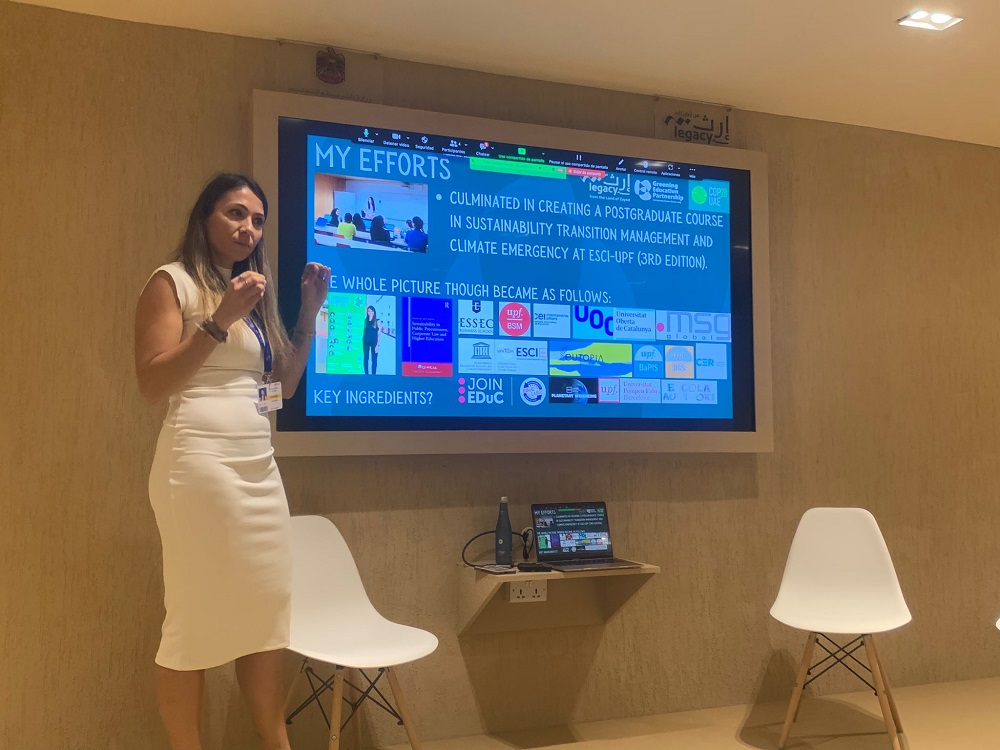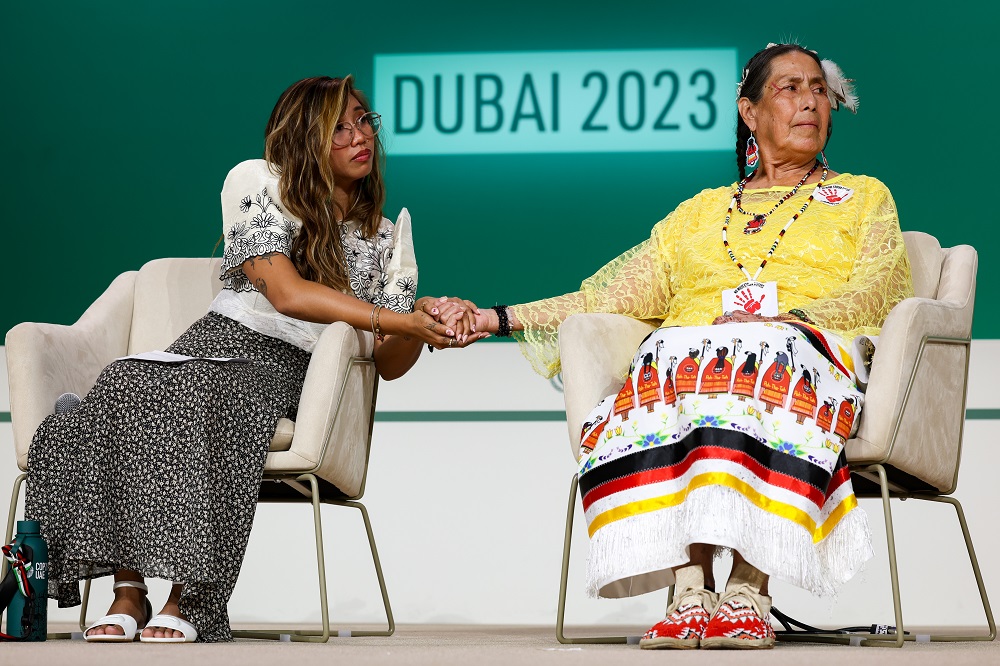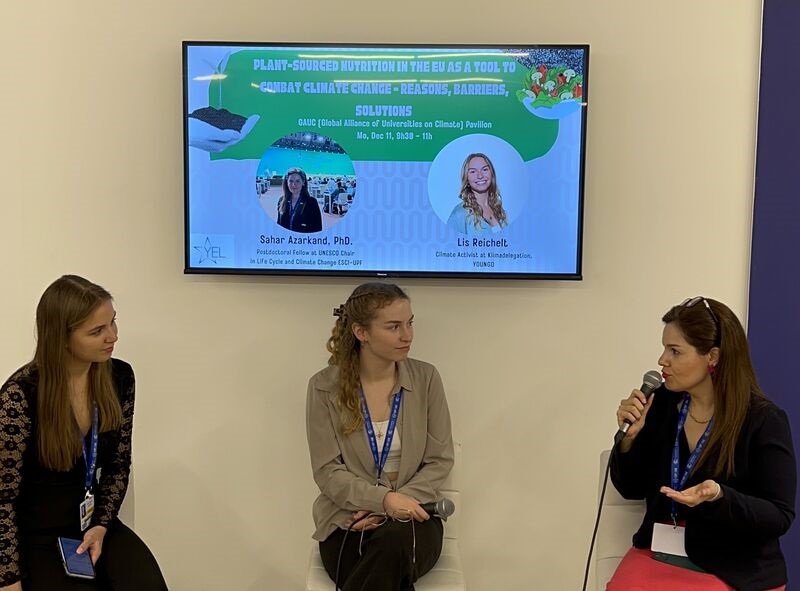UPF was present at COP 28, with sustainability and planetary wellbeing at the center of the debate
UPF was present at COP 28, with sustainability and planetary wellbeing at the center of the debate
Several individuals with ties to the UPF Centre for Studies on Planetary Wellbeing and the ESCI-UPF UNESCO Chair in Life Cycle and Climate Change played an active role in the United Nations Framework Convention on Climate Change, which took place in December 2023 in Dubai, with a view to connecting with other institutions and presenting the University’s initiatives in this field.

Towards the end of 2023, the 28th Conference of the Parties to the United Nations Framework Convention on Climate Change, better known as COP 28, was held in Dubai (United Arab Emirates). Several individuals with ties to Pompeu Fabra University, including members of the UPF Centre for Studies on Planetary Wellbeing and the ESCI-UPF UNESCO Chair in Life Cycle and Climate Change, played an active part, with a view to networking with other universities and institutions and presenting the various initiatives and projects being undertaken at UPF in this regard.
The discussions entered into at COP 28 focused on topics such as the gradual phase-out of fossil fuels around the world, the launch of the fund for damages and harm and the results of the first global stocktake. Within an educational context, COP 28 devoted an entire pavilion to the various levels of formal education and stressed the responsibility of universities and schools in paving the way to a more sustainable future for younger generations.
COP 28 stressed the responsibility of universities and schools in paving the way to a more sustainable future for younger generations
This venue hosted a number of talks and presentations providing practical examples of educational initiatives currently being undertaken around the world to tackle the climate crisis. These presentations addressed aspects such as raising awareness of sustainability through art, university-industry partnerships in finding climate solutions, the need to integrate sustainability into curricula, the decarbonisation of universities, education for climate justice and leadership and climate governance as a driver for sustainable growth.

Which persons linked to UPF took part and with what objective?
Five persons from UPF had the opportunity to take part and be present in several discussions: Lela Mélon, lecturer in Business Law for Sustainability at UPF and researcher for the ESCI-UPF UNESCO Chair in Life Cycle and Climate Change; Sahar Azarkamand and Cristina Campos, a postdoctoral researcher and project technician, respectively, in the aforementioned Chair; Carla Lancelotti, lecturer and ICREA researcher from the Department of Humanities and director of the UPF Centre for Studies on Planetary Wellbeing; and Ariadna Moreno, project manager at the Centre.
The main aims behind UPF’s participation included connecting with other universities and institutions working on climate change, sustainability and aspects related to planetary wellbeing; promoting the Centre for Studies on Planetary Wellbeing and UPF as a centre committed to the Sustainable Development Goals; learning about other relevant cross-cutting initiatives that could be implemented at the institution; and understanding how the University could bolster its participation in the annual conference’s upcoming editions.
UPF had the opportunity to connect with other universities and institutions working on climate change, sustainability and aspects related to planetary wellbeing
There was also a strong interest in hearing the discussions and debates of the so-called RINGOS (Research and Independent Non-Governmental Organisations) on the latest developments in scientific policy and development in fields relevant to the ESCI-UPF UNESCO Chair, such as life cycle assessment and agriculture. Lastly, efforts were made to boost ties with the scientific and business communities to reinforce the Chair’s position within these collectives and increase the opportunities to cooperate in future projects.
Aside from learning about new global initiatives, new contacts were also made with, for example, the directors of the Cambridge Institute for Sustainability Leadership, a centre focused on addressing critical global challenges through applied research and the creation of business groups, as well as with regional directors from UNESCO and representatives from other universities and research institutes, including the Senckenberg Society for Nature Research, one of the world’s most important institutes in the field of biodiversity. The main aim behind such contacts is to develop joint educational programmes.
Participation in panels, presentations and talks, raising the University’s profile
During the Conference, Lela Mélon had the opportunity to discuss her personal and professional trajectory in the field of sustainability and, more specifically, corporate sustainability and present a number of the initiatives with which the University is currently engaged, such as the ESCI-UPF Postgraduate Course in Sustainability Transition and Climate Emergency Management and UPF’s Planetary Wellbeing initiative.
The presentation focused largely on the impact factor (video of the session from YouTube) and was followed by a round table discussion featuring a number of invited experts: Aykut Tellibayraktar (Sustainability Task Force Innovation & Growth Manager at MSG Global Solutions), Johanna Wagner (co-founder and ambassador of Educ Label), Francesc Padró (director of the UNESCO International Institute for Higher Education) and Chris Desai (director-general at UOCEAN and UEARTH, founder of the Vayyu Foundation and director-general at Vayyu).

Sahar Azarkamand also took part in the panel entitled “Plant-Based Foods in the European Union as a Tool against Climate Change: Reasons, Obstacles and Solutions”, in which discussion centred on the environmental and economic impact of different sources of protein. Some of the most relevant aspects raised include the importance of sustainable diets, the transition to plant-based foods and the need to change our eating habits. Also present in the talk was Lis Reichelt, a climate activist from the Global Youth Climate Movement.
Lastly, Carla Lancelotti took part as a speaker in the talk organised by UNESCO under the title “The Natural and Cultural Heritage of the Oases in Egypt: Status, Values, Futures” (document hosted on Drive), in which she discussed the value of cultural, archaeological and ethnographic data in developing sustainable practices in arid environments. The presentation was held alongside other renowned experts, including Núria Sanz, director of the UNESCO Regional Office in Egypt, and Klement Tockner, president of the Senckenberg Society for Nature Research. For more information on the event, click here:
It should be noted that most of the universities that took part in the COP hailed from either the United States or United Kingdom. Other universities were primarily represented in the form of hubs or international alliances, with European universities particularly underrepresented. This provided UPF the opportunity to consider a possible link with global university networks such as the Global Alliance of Universities on Climate and taking part in and being represented at similar conferences in the future.
Lastly, the conclusions of COP 28 in terms of education represent a major change in how sustainability is taught, particularly as regards its integration into global curricula and due to the shift towards multidisciplinary approaches focusing on environmental, economic and social aspects. This approach is key to effectively addressing the complex nature of issues related to climate, a field in which great emphasis was placed on the importance of experience-based learning.
